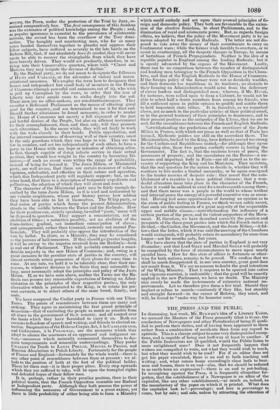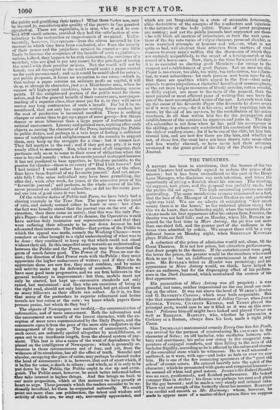THE PRESS AND THE PUBLIC. .+f-.
IN discussing, last week, Mr. BuewEieS idea of a Literary Union, we accused the Masters of the Press generally (that is to say, the conductors of Newspapers and other Periodicals) of being ill quali- fied to perform their duties, and of having been appointed to them rather from a combination of accidents than from any regard to aptitude. This is a charge subject to some very distinguished excep- tions, and is capable of being met half-way at least by another . if the Public Instructors are ill qualified, would the Public listen to more enlightened ones? Does it not frequently happen that writers are compelled to write, not what they would wish to teach, but what they would wish to be read? For if an editor does not get his paper circulated, there is an end to both teaching and writing ; and, what conies home exceedingly close both to busi- ness and bosom, there is an end—alas, that we should be reduced. to so earth-born an expression !—there is an end to pot-boiling. In inveighing against the Press, it is frequently altogether fors gotten, that the establishment of a Newspaper is an affair of the capitalist, like any other establishment,—as much so, indeed, as the manufactory of the paper on which it is printed. What does the capitalist look to?--percentage; • and how is percentage to come, but by sale; and sale, unless by attracting the attention of lthe public and gratifying their tastes ? 'What these ttastes. are, may , be learned by considering stile quality of.the papera in n'ne greatest eirculatio . There are capitalists, it is true, who waind be con- --gni w small returns, provided they had the satisfaction of con- tributing to the instructiori air improvement of mankind. Inane_ tunately, however, Newspapers—from the odium incurred by the manner in which they have been conducted, also from the novelty of their power and the prejudices against its exercise—are little likely to become the recipients of the benefits of such capitalists — unless, indeed, they happen to be rich visionaries, the ere-attires of a et- °Wile t, who are glad to pay any money for the privilege of boring the world with their peculiar notions. But the world will not be bored; not all the capital in the world would make a paper carried on for such persons read ; and As it would be established for private, not public parposes, it forms no exception to our case,—which is, that unless a paper returns an ordinary profit on capital, it will drop, orehange its character, just as a Manchester man, when he -cannot sell high-priced cambrics, takes to manufacturing coarse -prints. If the enlightened portion of the public want for them- selves, and for the general benefit of their countrymen, newspaper- reading of a superior Blass, they must pay for it, or they will never secure any long continuance of such a benefit. For let it be re- membered, that not only has superior writing fewer readers, but the cost of production is increased manifold. There is nothing cheaper or easier than to get up a paper of mere gossip—few things dearer or more laborious than a large paper of instruction and rational amusement. Literary and political men, aspiring after such .objects as raising the character of the Press, instructing the Public in public duties, and perhaps in a vain hope of finding a sufficient mass of intelligence and enlightenment in the country to support them, may keep up the struggle for a time : but it cannot last. They fall martyrs in the end ; and if they get any pity, it is very nearly allied to contempt. But, what is most of all singular, their partisans only seem to come to their sense of obligation when the case is beyond remedy : when a favourite journal is stopped because it has not pandered to base appetites, to frivolous pursuits, to the passion for slander—there is an outcry of " Had I but known ! had I had notice! I would rather have given this, that, or the other, than have been deprived of my favourite journal." And vet, miser- able folly ! this same individual may have been grumbling, day after day, week after week, for years, at the excessive price of his "favourite journal;" and perhaps, in the whole course of his life, never procured an additional subscriber, or did his favourite jour- nal one iota of good since it was born. Of the relative duties of Public and Press, we have lately had a shining example in the True Sun. The paper was on the point of ruin, and nobody seemed either to know or care : but when the fact was broadly stated that the journal was on the eve of de- struction, then there came an outcry, that this was the only Peo- ple's Paper—that in the event of its demise, the Operatives would have neither daily instructor nor representative—and that they were suffering their advocate to be put down because he had advocated their interests. The Public—that section of the Public to which the appeal was made, namely the Working Classes—were somehow or other brought to a right understanding of what was to be done : they combined to keep up that which could not stand without their aid. In this imperfect essay towards an understanding between the Public and the Press, perhaps may be discerned the germ, of much future good. The Power of the Press no one de- nies ; the direction of that Power rests with thePublic : they must appreciate the higher endeavours of writers; and if they who do appreciate them are now few, they must combine, and by union sand activity make up for deficiency. of numbers. Hitherto we have seen good taste progressive, and we are firm believers in the general tendency to improvement : but then, models must not only be started, but kept up—successive standards not only raised, but maintained : and they who are conscious of being in the right road, should not only hurry forward, but get about them as many followers as their efforts can collect. As it is, we fear that many of the pretenders to superior refinement and better morals are but rotten at the core : we know which papers these persons praise, but which do they buy?
The objects of Newspapers are twofold,—the communication of information, and of mere amusement. Both the information and the amusement are usually of the lowest character, with the ex- ception of mere news communicated by the Daily Papers, and the comments upon it from the pens of the more able coadjutors in the management of the paper. The matters of amusement, where such occur, are ordinarily spoiled altogether by unskilfulness, or spun out to an inordinate length, from the absurd system of pay- ment. This last is also a cause of the want of dependence to be placed on the intelligence of Newspapers; which is generally er- roneous in three circumstances out of four, and yet, from the wideness of its circulation, has all the effect of truth. Scandal and slander, occupying the place of satire, may perhaps be classed under the head of amusement: it is, however, that sort of sport which, if it be fun for some, is.death to others ; and which, as it is only to be put down by the Public, the Public ought to rise up and extin- guish. The Public must, however, be much better informed before they take interest in higher things. And this brings us back to -our main proposition, which at this moment we have greatly at heart to urge. Those journals which the readers consider to be na- tionally beneficial, let them beasuppcuted nationally. We could point out more than one puthlieation, the talent and wisdom and activity .of .which are, we may -say. universally appreciated, and which are yet. languishing in a state of miserable betweenity, alike destructive of the energies of the conductors and injurious to the interests of the body politic. Times of great pregnancy are coming ; and yet the public journals best supported are those who will blink all matters of importance, or turn the -vast ques- tions of the day into topics of vulgar clamour, personal slander, or more wretched attempts at humour and wit,—or, what is not quite so bad, will abstract their attention from matters of vital concern to every man's welfare (for the discussion of which they are certainly unqualified), to the report of a boxing-match or the record of a horse-race. Now, then, is the time for a grand effort— it is as essential as electing good Members—for seeing to the support and establishment of good Papers. Let no man say this Paper is too clever, too able, too witty, too industrious, too inform- ing, to want subscribers : let such persons now learn once for all, that these are qualities which appeal to the Few—that noisy appeals to gross prejudices, a rhetorical handling of commonplace; or the yet more vulgar resources of bloody:murder, rotten scandal, or filthy exploit, are more to the taste of the general, than the most pointed or most efficient piece of writing that can leave the pen of the most accomplished writer of the age. Let each man take up the cause of his favourite Paper (the favourite he dares avow) as if it were his own,—for it is his own; and by inquiring into its wants, by the aid of his services, by the contribution of his active exertions, do all that within him lies for the propagation and establishment of the opinions he approves and joins in. The duty of a subscriber is not done when he has paid his sevenpence or his shilling, or perhaps only contributed his centesimal fraction to the club or reading-room; for if he be one of the elite, let him look around him, and see how few there are like him, and whether or not, of those few, the most have not been drawn into some other and less worthy channel, or have never had their attention awakened to the great point of the duty of the Public to a good Journal.



























 Previous page
Previous page